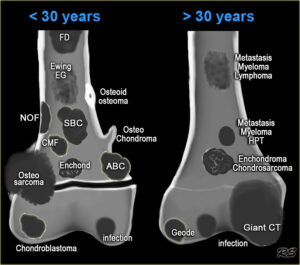Bone tumor
A bone tumor is an abnormal growth of cells within a bone. A bone tumor may be cancerous (malignant) or noncancerous (benign).
Causes
The cause of bone tumors is unknown. They often occur in areas of the bone that grow rapidly. Possible causes include:
- Genetic defects passed down through families
- Radiation
- Injury
In most cases, no specific cause is found.
Osteochondromas are the most common noncancerous (benign) bone tumors. They occur most often in young people between the ages of 10 and 20.
Cancers that start in the bones are called primary bone tumors. Bone cancers that start in another part of the body (such as the breast, lungs, or colon) are called secondary or metastatic bone tumors. They behave very differently from primary bone tumors.
Cancerous primary bone tumors include:
- Chondrosarcoma
- Ewing sarcoma
- Fibrosarcoma
- Osteosarcomas
Cancers that most often spread to the bone are cancers of the:
- Breast
- Kidney
- Lung
- Prostate
- Thyroid
These forms of cancer usually affect older people.
Bone cancer is more common in people who have a family history of cancers.
Symptoms
Symptoms of bone tumor may include any of the following:
- Bone fracture, especially from slight injury (trauma)
- Bone pain, may be worse at night
- Occasionally a mass and swelling can be felt at the tumor site
Some benign tumors have no symptoms.
Exams and Tests
The health care provider will perform a physical exam. Tests that may be done include:
- Alkaline phosphatase blood level
- Bone biopsy
- Bone scan
- Chest x-ray
- CT scan of the chest
- MRI of the bone and surrounding tissue
- X-ray of bone and surrounding tissue
- PET scan
The following tests may also be ordered to monitor the disease:
- Alkaline phosphatase isoenzyme
- Blood calcium level
- Parathyroid hormone
- Blood phosphorus level
Treatment
Some benign bone tumors go away on their own and do not need treatment. Your provider will closely monitor you. You will likely need regular imaging tests, such as x-rays, to see if the tumor shrinks or grows.
Surgery may be needed to remove the tumor in some cases.
Treatment for cancerous bone tumors that have spread from other parts of the body depends on where the cancer started. Radiation therapy may be given to prevent fractures or to relieve pain. Chemotherapy may be used to prevent fractures or the need for surgery or radiation.
Tumors that start in the bone are rare. After biopsy, a combination of chemotherapy and surgery is usually necessary. Radiation therapy may be needed before or after surgery.
Support Groups
You can ease the stress of illness by joining a cancer support group. Sharing with others who have common experiences and problems can help you not feel alone.
Outlook (Prognosis)
How well you do depends on the type of bone tumor.
Outcome is usually good in people with noncancerous (benign) tumors. But some benign bone tumors can turn into cancer.
People with cancerous bone tumors that have not spread may be cured. The cure rate depends on the type of cancer, location, size, and other factors. Talk to your provider about your particular cancer.
Possible Complications
Problems that may result from the tumor or treatment include:
- Pain
- Reduced function, depending on the tumor
- Side effects of chemotherapy
- Spread of the cancer to other nearby tissues (metastasis)